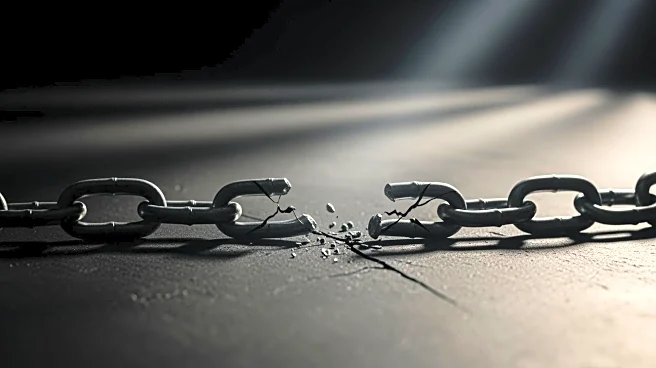What's Happening?
Two survivors of grooming gangs, Fiona Goddard and Ellie Reynolds, have resigned from the government's inquiry panel, citing concerns over the handling of the process. The inquiry, announced by Prime Minister
Sir Keir Starmer, aims to investigate grooming gangs across England and Wales. Goddard and Reynolds expressed dissatisfaction with the selection of potential chairs, both of whom have backgrounds in policing and social services, which they view as a conflict of interest. They argue that these services were involved in the cover-up of the crimes they suffered. Safeguarding Minister Jess Phillips has denied any cover-up, asserting the government's commitment to addressing the failures in tackling these crimes. The survivors have also criticized the inquiry's environment, describing it as toxic and manipulative, with restrictions on their ability to question potential chairs. The government has yet to appoint a chair, but Phillips assures that the appointment will be made shortly.
Why It's Important?
The resignation of Goddard and Reynolds highlights significant concerns about the integrity and focus of the inquiry into grooming gangs. Their departure raises questions about the government's ability to conduct a transparent and effective investigation into these serious crimes. The involvement of individuals with backgrounds in services accused of covering up the abuse could undermine trust in the inquiry's outcomes. This situation could impact public confidence in government-led investigations and the ability to address systemic failures in protecting vulnerable individuals. The inquiry's scope and focus are crucial, as expanding it beyond grooming gangs might dilute the specific issues related to racial and religious motivations behind the abuse, which are central to understanding and preventing such crimes.
What's Next?
The government is expected to appoint a chair for the inquiry soon, with the aim of restoring trust among survivors and ensuring a thorough investigation. The appointment process and the inquiry's scope will be closely watched by stakeholders, including survivors, advocacy groups, and the public. The government must address the concerns raised by Goddard and Reynolds to prevent further resignations and ensure the inquiry remains focused on grooming gangs. The outcome of this inquiry could influence future policies and practices related to child protection and the handling of abuse cases.
Beyond the Headlines
The resignation of the survivors from the inquiry panel underscores the ethical and cultural challenges in addressing historical abuse cases. It highlights the need for impartiality and transparency in government inquiries to prevent retraumatization of survivors. The inquiry's handling could set a precedent for how similar cases are approached in the future, emphasizing the importance of survivor-centered processes and the acknowledgment of racial and religious factors in abuse cases.










